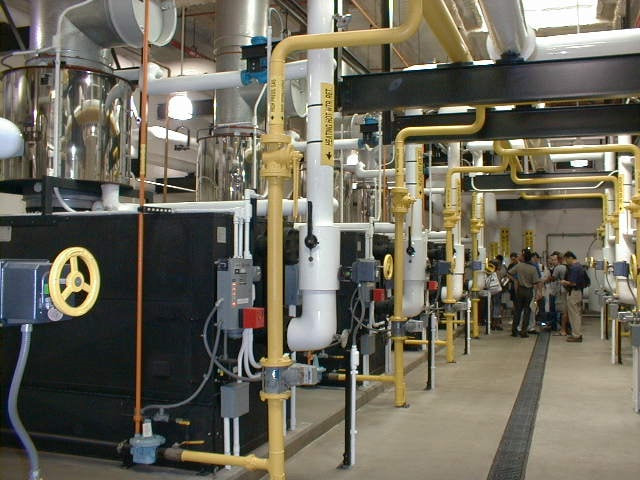Applications Analysis: Insulated 6” Horizontal Pipe at 1000°F
Proposition:
An industrial boiler manufacturer is currently looking to insulate a 6” diameter, 72” long horizontal pipe in one of its boiler units. The pipe and boiler system to which the pipe is connected both operate 24 hours/day, 365 days per year continuously, and gives the pipe a hot face temperature of 1,000°F. Currently, the pipe is wrapped with a 1” thickness of standard fiberglass pipe wrap.
Goals:
Due to increases in energy cost associated with the operation of the boiler unit, in addition to an increasing demand for process efficiencies and conformity to new safety standards for the personnel who operate the machinery, the company is looking to achieve the following goals by re-insulating the pipe:
Proposals:
In addition to the fiberglass pipe wrap currently being used, the company decides to consider two other materials and compare them to the stated goals. The first of the additional two materials being considered is a rigid Calcium Silicate material. The second is ThermoDyne’s DynaGuardä Flexible 16# material.
Thermal Analysis & Comparison:
Proposition:
An industrial boiler manufacturer is currently looking to insulate a 6” diameter, 72” long horizontal pipe in one of its boiler units. The pipe and boiler system to which the pipe is connected both operate 24 hours/day, 365 days per year continuously, and gives the pipe a hot face temperature of 1,000°F. Currently, the pipe is wrapped with a 1” thickness of standard fiberglass pipe wrap.
Goals:
Due to increases in energy cost associated with the operation of the boiler unit, in addition to an increasing demand for process efficiencies and conformity to new safety standards for the personnel who operate the machinery, the company is looking to achieve the following goals by re-insulating the pipe:
- Minimize the amount of heat lost through the walls of the pipe, thus ensuring greater equipment process efficiency.
- Minimize energy cost associated with keeping the pipe at its desired temperature.
- Achieve a cold face temperature of 150F (touchable temp) for the proximity personnel who operate the equipment.
Proposals:
In addition to the fiberglass pipe wrap currently being used, the company decides to consider two other materials and compare them to the stated goals. The first of the additional two materials being considered is a rigid Calcium Silicate material. The second is ThermoDyne’s DynaGuardä Flexible 16# material.
Thermal Analysis & Comparison:
Results:
Financial Analysis & Comparison:
Given the differences in heat loss (Btu/Sf/Hr) for the three materials, the following can be estimated for the amount of heat lost through the system in $/year for each:
- 1” of DynaGuard Flexible 16# material yields a cold face temperature 65°F lower than the Calcium Silicate material, and 162°F lower than the Fiberglass Pipe Wrap, making it substantially safer for the employees who operate the machinery. Neither the Calcium Silicate, nor the Fiberglass Pipe Wrap, accomplish the objective stated at their current thicknesses.
- A thickness of 4” of Fiberglass Pipe Wrap would be required to equal a cold face comparable to 1” of DynaGuard Flexible 16# material, and a thickness of 2.25” of Calcium Silicate material would be required for the same effect.
- 1” of DynaGuard Flexible 16# material yields a heat loss of 180.27 Btu/Sf/Hr less than the Calcium Silicate material, and 534.63 Btu/Sf/Hr less than the Fiberglass Pipe Wrap.
- Over the course of a production year and given the size of the pipe, the DynaGuard Flexible 16# material saves approximately 14.8 million Btu more than the Calcium Silicate material, and 44.1 million Btu more than the Fiberglass Pipe Wrap.
Financial Analysis & Comparison:
Given the differences in heat loss (Btu/Sf/Hr) for the three materials, the following can be estimated for the amount of heat lost through the system in $/year for each:



